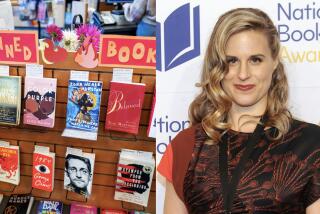Novel of gay love brings out the police
BAKU, AZERBAIJAN — Alekper Aliyev’s cellphone buzzed on the iron table. “What’s going on is a nightmare,” said the text message from one of his readers. “I worry about you. Take care. Don’t give up.”
The 31-year-old Azerbaijani novelist says he knew his latest book would cause a storm, but he never imagined the police would get involved.
“Artush and Zaur,” the story of a gay love affair between an Azeri and an Armenian amid war between their countrymen as the Soviet Union is collapsing, is cultural dynamite for mainly Muslim Azerbaijan.
By Aliyev’s count, 150 copies have been sold since the book was published in January, a tiny number by international standards but not bad for a homegrown novelist in a country of 8.7 million people.
That was, until this month, when Baku’s popular Ali & Nino bookstore chain -- the only one willing to sell “Artush and Zaur” -- said police had ordered the book removed from its shelves.
A book discussion between the author and readers was canceled amid reports of threats and intimidation.
“The police told them, ‘If you don’t do it, we’ll do it ourselves,’ ” Aliyev told Reuters. “And they withdrew all the books from sale.”
He said the owner of Ali & Nino had just called to say police had closed two of its stores. They reopened a day later.
An Interior Ministry spokesman denied any knowledge of the case, saying, “The police do not interfere in trade and the selling of books.”
But some Azerbaijani Internet forums have seized on the dispute as further proof of Azerbaijan’s disdain for human rights and freedom of expression under President Ilham Aliyev, who succeeded his late father, former Communist Party boss Heydar Aliyev, in 2003.
The country voted in a referendum Wednesday to scrap the two-term presidential limit, clearing the way for Aliyev to continue in office indefinitely beyond 2013 if he can keep winning reelection.
Critics accuse the authorities of curbing freedoms under cover of an economic boom fueled by the nation’s oil and natural gas, which is piped from the Caspian Sea to Western Europe. Dissent is discouraged, and sometimes stamped out.
“I thought democracy meant freedom of expression, freedom of faith and freedom of the press,” read a posting on one blog discussing the saga.
Azerbaijan’s authorities say they are committed to international standards of democracy but that they have an obligation to protect the country from forces they say are trying to sow instability.
The novel, the writer’s sixth, strikes at the hatred that persists between many Christian Armenians and Muslim Azeris since ethnic Armenians in the Nagorno-Karabakh region broke away from Azerbaijani’s rule in the 1990s.
The conflict still defies resolution or reconciliation. Soldiers continue to die on the frontline in sporadic clashes, and Azerbaijan has not ruled out taking back the region by force.
Crucially though, the relationship in the book is played out between two homosexual men, still a taboo subject in traditionally conservative Azerbaijan.
“My book is a fight against stereotypes,” said Aliyev. “In Azerbaijan there are two main stereotypes, the gay man and the Armenian. The worst thing you can be is gay or Armenian, or to have any relation to Armenia.”
“I want to deprive them of this instrument, and to explain to people they should not be afraid.” He said police had claimed the book was “against our values.”
“How could such [expletive] be written?,” an anonymous blogger wrote on one Azerbaijani forum. “And to make an Armenian one of the main characters! It was disgusting to read. Some things should be respected -- your own country, for example.”
The owner of Ali & Nino declined to be interviewed. The book cover does not name the real publisher. Currently available only in Azerbaijani, Aliyev said it would be translated into Russian and that friends in Yerevan, Armenia’s capital, planned to publish an Armenian version.
The novel seeks deliberate comparison to “Ali and Nino,” the popular love story of a Muslim man and Georgian Christian woman in Baku that was first published in 1937.
In the end, Nino flees the Azerbaijani capital for Georgia and Ali dies defending Azerbaijan from the invading Bolsheviks after the 1917 revolution. For Aliyev, Artush and Zaur’s love is equally doomed. The two men throw themselves from Baku’s 12th century Maiden Tower, long a symbol of forbidden love.
“Homosexual love is just the background to this novel,” he said. “This book is about our pointless conflict, our pointless war, and about how oligarchs rule societies in both countries.”
More to Read
Sign up for Essential California
The most important California stories and recommendations in your inbox every morning.
You may occasionally receive promotional content from the Los Angeles Times.










